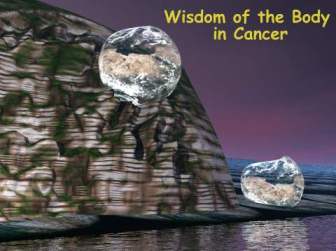
 |
The figure illustrates two facts. While 76% patients succumbed to the disease, 24% survived 20 years. Most of the time they were in remission and appeared healthy. Since they eventually died from their disease, we can conclude retrospectively that all carried undetected micrometastases. Some carried metastasis for at least 19 years. For example, in a woman who lived with micrometastasis that long, during this prolonged remission her organism apparently "knew" how to live with, and adapt to micrometastasis. Such a knowledge was defined previously as "Wisdom of the Body" (2). It controls organic regulations and cannot be explained reductionistically as done for physical phenomena.
Homeostasis
One manifestation of the Wisdom of the Body is homeostasis. We observe it in our clinical practice and appreciate its existence. It is an important indicator of patient's health, and yet its exact nature is obscure. How is it maintained? True, homeostasis is a kind of equilibrium, yet unlike chemical and physical equilibria it cannot be reduced to its elements since they are not known. Homeostasis is only one manifestation of the Wisdom of the Body. Immunity is another one, and there are many more, still waiting to be discovered. They reflect the cardinal role of the organism in disease, manifested by normativity (3). The organism is not dragged passively form health to disease. The transition is normative. This is why the organism was regarded as first among physicians (5), and disease, as a new life (6). Like homeostasis, disease cannot be reduced to its elements and can be understood only in the context of the individual. Diseases do not exist by themselves, there are only sick people.
It appears as if genetic and hereditary diseases are driven by one component, a missing gene product. Yet even this one-component disease can be understood only in the context of the organism. Every genetic disorder has epigenetic manifestations that are driven by the Wisdom of the Body.
The Challenge of Breast Cancer
Was the title of a recent meeting in Brugge, Belgium, that was organized by The Lancet (7). "Have we lost our way"? asked its editor (8) pointing to the fact that for 50 years mortality rate of breast cancer has remained nearly static (9). "There are no reliable data to suggest that screening reduces mortality in the youngest or oldest age groups (8). The editor, Robin Fox, urges the reader to join the conference "where the aim is to challenge dogma and redirect research efforts along more fruitful lines" (8). Despite the good intentions the questions raised by him remained unanswered: "Are chemotherapists approaching the point where they do more harm than good?" "Might intensive chemotherapy be the medical equivalent of radical mastectomy - with ever more ferocious regimens based on an erroneous idea of the disease?"
Breast cancer is not just a disease of the breast
For fifty years breast cancer research and therapy were preoccupied with the breast ignoring the role of the organism in disease. Treatment of the breast did not reduce age adjusted mortality of breast cancer since it was wrong! Radical mastectomy yielded to lumpectomy with adjuvant chemotherapy, and when both failed, aggressive chemotherapy was instituted. Treatment failed since ignoring the role of the wisdom of the body in cancer. Oncology claims that neoplasia encroaches upon an indolent host and the long survivors were lucky to have a relatively benign cancer. Why not turn this argument around and assume that the wisdom of their bodies enabled them to live with cancer that long? Cancer is a creative endeavor of the organism in response to carcinogens. In order to understand its true meaning we ought to distinguish between two ingredients of cancer, carcinogen and wisdom of the body .
After all, neoplasia was created by the organism and controlled by it from the very beginning. Like all diseases, cancer is a creative endeavor. It is a new life! (10,11).
References
1. Axtell LM, Ardyce J, Asire MS, Meyers MH. Cancer patient survival report No. 5 DHEW Publ No. (NIH) 77-992,1976.
2 Cannon, WB. The Wisdom of the Body. Norton, New York, 1932
3 Zajicek, G. The Normal and the Pathological. Cancer J. 7: 48-49,1994.
4 Canguilhem G. Le normal et le pathologique. translated into English by Fawcett CR, Cohen RS. Zone Books New York 1991.
5 Guyenot , in Canguilhem, ibid. p. 130.
6 Goldstein, in Canguilhem, ibid. p.188.
7 The Challenge of Breast Cancer. Organized by The Lancet, Brugge, April, 1994.
8 The Lancet 341,243,1993
9 Zajicek G. How to evaluate unproved methods in oncology? Cancer J. 5:180,1992
10 Zajicek G. Hypothesis: Cancer is a metabolic deficiency. Cancer J. 4:356,1991
11 Zajicek G . Cancer is a metabolic deficiency. In: New frontiers in cancer causation. Iversen OH Editor. pp. 81-96. Taylor & Francis Washington DC. 1993.